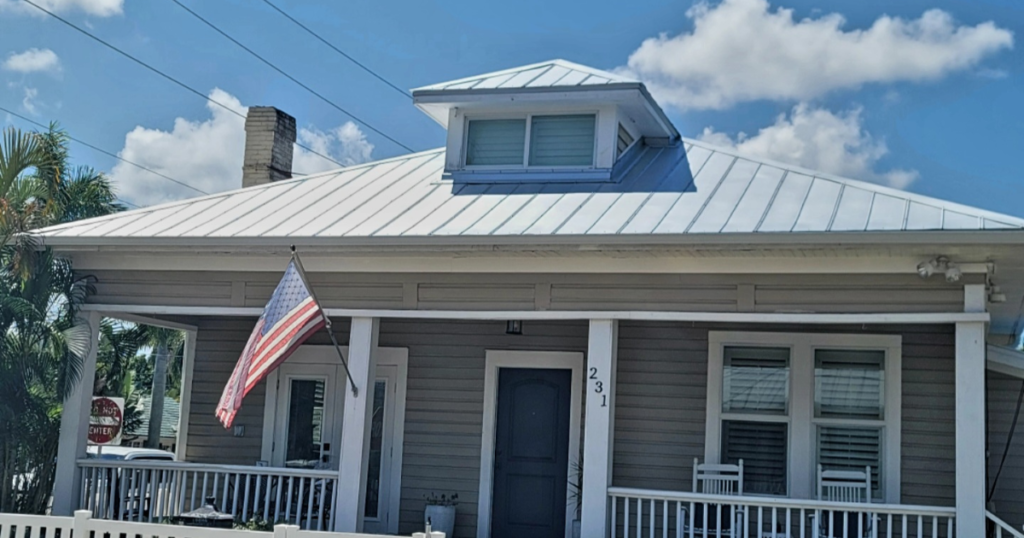When thinking about roofing materials, most people consider factors like durability, energy efficiency, and cost. However, one often overlooked but highly important aspect of roofing is its acoustic performance. A roof’s ability to reduce noise is essential for creating a peaceful and comfortable living or working environment, especially in areas prone to external noise like traffic, airports, or industrial zones.

Selecting the best roofing materials for noise reduction can make a significant difference in how much external sound enters your building. If you’re considering a roof replacement and want to improve your home or commercial building’s acoustic environment, this guide will help you choose the right roofing materials for superior noise reduction. Interested in reducing noise in your home or business? Contact us today to explore how the best roofing materials can improve acoustic performance during your roof replacement project.
1. Why Acoustic Performance Matters in Roofing
The acoustic performance of your roof impacts the amount of noise that enters your building. If you live or work in a noisy area, poor sound insulation can make it difficult to relax, concentrate, or sleep. Noise pollution can also lower the value of your property or make it less desirable to tenants or buyers.
The best roofing materials for noise reduction can help you create a quieter and more comfortable environment. By blocking or absorbing sound, these materials reduce the impact of external noise, creating a more peaceful indoor space.
Noise reduction in roofing is primarily achieved through materials that either:
– Reflect sound away from the building.
– Absorb sound energy, preventing it from entering the structure.
2. Top Roofing Materials for Noise Reduction
Different roofing materials have varying levels of acoustic performance. Some are naturally better at blocking or absorbing noise, making them ideal choices if soundproofing is a priority. Let’s explore some of the best roofing materials for noise reduction.
- Clay and Concrete Tiles
Clay and concrete tiles are excellent at reducing noise due to their density and thickness. These heavy roofing materials act as a natural barrier to sound, absorbing vibrations and blocking external noise from entering your building.
Clay and concrete tiles are particularly effective in areas with high levels of noise pollution, such as cities or near busy roads. Their ability to absorb sound makes them one of the best roofing materials for acoustic performance.
- Slate Roofing
Slate is another heavy and dense roofing material that provides excellent soundproofing. Its natural composition makes it a durable and long-lasting option that can significantly reduce external noise.
Slate roofing can last up to 100 years, making it not only a soundproofing solution but also an investment in durability. If you’re considering a roof replacement and looking for a material that offers superior noise reduction, slate is an excellent option.
- Asphalt Shingles
Asphalt shingles are one of the most popular roofing materials due to their affordability and ease of installation. They also offer decent soundproofing capabilities, especially when installed with additional underlayment.
When layered with sound-dampening materials like insulation or underlayment, asphalt shingles can reduce noise by absorbing vibrations and preventing sound from penetrating the roof. While not as effective as heavier materials like slate or concrete, asphalt shingles are a cost-effective option for noise reduction in residential areas.
- Metal Roofing
Metal roofing is known for its durability and energy efficiency, but its acoustic performance depends on several factors. By itself, metal roofing can amplify noise, such as rain or hail, due to its thin and reflective nature. However, with proper insulation and underlayment, metal roofs can provide adequate noise reduction.
To enhance the soundproofing of metal roofs, it’s essential to use sound-dampening insulation or install additional layers, such as acoustic barriers. This combination can transform metal roofing into one of the best roofing materials for noise reduction in commercial and industrial buildings.
3. The Role of Underlayment in Noise Reduction
The underlayment installed beneath the roofing material plays a significant role in its acoustic performance. Underlayment adds an extra layer of protection against noise, helping to absorb sound vibrations and prevent them from entering your building.
For optimal noise reduction, consider using soundproofing underlayment materials such as:
- Rubberized asphalt: Known for its flexibility and sound-dampening properties, rubberized asphalt is a great choice for minimizing noise.
- Acoustic insulation: Materials like fiberglass or mineral wool insulation can be installed beneath the roof to enhance soundproofing.
- Felt paper: While felt paper is a standard underlayment option, thicker versions can provide additional noise reduction.
When planning a roof replacement, incorporating high-quality underlayment can significantly improve the roof’s ability to block or absorb noise, regardless of the main roofing material chosen.
4. When to Consider a Roof Replacement for Better Acoustic Performance
If noise is a constant issue in your home or office, a roof replacement with noise-reducing materials could be the solution you need. Here are some signs that a roof replacement for improved acoustic performance may be necessary:
- Persistent Noise Issues
If you frequently hear outside noises like traffic, airplanes, or loud neighbors, your current roof may not be adequately soundproofed. A roof replacement using the best roofing materials for noise reduction can help create a quieter environment.
- Old or Worn-Out Roofing
Older roofs may have deteriorated materials that no longer provide proper noise insulation. As roofing materials wear down, their ability to block or absorb sound diminishes. Replacing an old roof with modern, noise-reducing materials can restore comfort to your living or working space.
- Energy Efficiency and Noise Reduction
If you’re already considering a roof replacement to improve energy efficiency, now is the perfect time to choose materials that also offer noise reduction. Many energy-efficient roofing materials, such as slate or clay tiles, also provide excellent acoustic performance. Tired of the constant noise from outside? A roof replacement with soundproofing materials could be the solution. Contact us today to explore the best roofing materials for noise reduction and schedule a consultation.
5. Factors to Consider When Choosing Roofing Materials for Noise Reduction
Choosing the best roofing materials for noise reduction involves considering several factors, including the type of noise you’re trying to block, your budget, and the architectural style of your building. Here’s what you should keep in mind when selecting a roofing material:
- Type of Noise
Different materials block different types of noise. Heavy, dense materials like clay tiles are ideal for blocking low-frequency sounds like traffic, while asphalt shingles may be more effective at reducing higher-frequency sounds like rain.
- Budget
Soundproofing your roof can be more expensive than using standard roofing materials, but it’s a worthwhile investment if noise reduction is a priority. Materials like slate or concrete may have higher upfront costs but offer long-term durability and acoustic benefits.
- Building Type
The architectural design and location of your building will also impact your choice of roofing material. For example, a commercial building near an industrial area may require more robust soundproofing than a residential home in a quieter neighborhood.
- Durability
Consider the longevity and maintenance needs of the roofing materials you choose. Some materials, like metal and slate, can last for decades, providing both acoustic benefits and durability.
In Conclusion
Choosing the best roofing materials for noise reduction can significantly improve the comfort and tranquility of your building. Whether you’re considering a roof replacement for a residential or commercial property, materials like clay tiles, slate, and properly insulated metal can provide the acoustic performance you need to reduce unwanted noise.
If you’re looking for ways to improve your building’s soundproofing, consider investing in a roof replacement with noise-reducing materials. The result will be a quieter, more comfortable space, allowing you to escape the noise of the outside world. Ready to upgrade your roof for better noise reduction? Contact us today to learn more about the best roofing materials for acoustic performance and schedule your roof replacement consultation.
Need Roofing Services for your home,Contact us for more details


